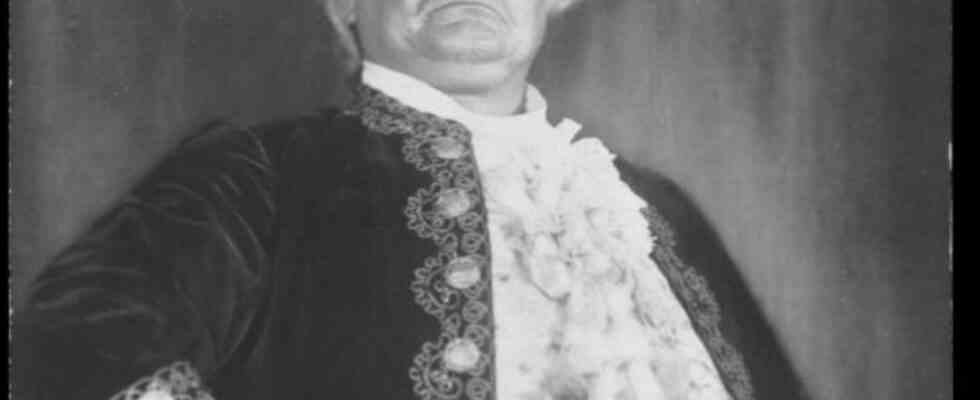The memory of a deceased person’s voice is the first thing we lose. No recordings are known of Berthold Sterneck’s powerful bass, famous all over Europe at the time. On the Internet there is only the creaky recording of a “Rosenkavalier”, 1936 at the Vienna State Opera, with Hans Knappertsbusch conducting, the legendary Lotte Lehmann singing the marshal. And for a brief moment you think you’re hearing Ochs auf Lerchenau, Sterneck’s signature role, in which the people of Munich also cheered him. Before they disenfranchised him, their Kammersänger, enslaved him with forced labour, and he died miserably in 1943. The state capital has now dedicated a memorial to the Jew Berthold Sterneck and his wife Margarethe, who committed suicide in 1945 out of desperation. This was preceded by a celebration for the two opera singers in the Pasinger factory, at which there was only one person who knew the Sternecks personally, who had heard them speak and sing: Charlotte Knobloch, who was almost ninety.
After receiving the deportation notice, Margarethe Sterneck (1894 -1945), here as Carmen, fled from Munich to Vienna with only one handbag. She went through many stations to Schwenningen, where she committed suicide out of desperation. There, a stumbling block, a small commemorative plaque laid in the ground, commemorates the opera singer.
(Photo: Picasa)
The meeting with the President of the Israelite Religious Community was a great, emotional moment for the descendants of the Sternecks, who had come from the USA, Scotland and Frankfurt. Because Jenny Nash, Esta Sterneck and Peter Sanders only know their grandparents from the stories told by their own parents, who escaped the Nazi murderers. Kurt Sterneck, the son from his first marriage, survived the concentration camp in Germany as a so-called half-Jew. Daughter Johanna (“Hanni”) was able to flee to England in 1939 with one of the last children’s transports. Charlotte Knobloch was slightly younger than Hanni when her father, a fervent Wagnerian, asked the Sternecks in 1940 to take his daughter in for a while. Charlotte Knobloch tells this episode entirely from her experiences as a child, who had to move from one hiding place to the next after the November pogrom, also to complete strangers like the Sternecks: famous people once, now marginalized and impoverished, they had their beautiful house in Pasing undervalued have to sell. The then ten-year-old Charlotte met two people who lovingly took care of her. And yet she runs away from them at the first opportunity. Back to the father, who immediately calls the Sternecks, who were worried about the girl like crazy.
Today there is an apartment building at Pasinger Presselweg 1, where the Sternecks’ villa was once located. The singer couple, who had no income after being banned from working, had to sell their home in 1938 – below the market price.
(Photo: private)
At the celebration in the Pasinger factory, Margarethe and Berthold Sterneck are “put in the spotlight”, according to a project by the Pasinger history workshop, which in the noughties followed in the footsteps of many Jewish people from the west of Munich and their fates in 2008 in one book project and exhibition impressively documented. The connection to today was important to the local historians: Almuth David was not only helped by her exceptional detective instincts, but also by chance, and she succeeded in finding the Sternecks’ descendants. More than a decade and countless e-mails and zoom conferences later, the time had come for the artist couple to be erected as a memorial: a slender stele with a likeness and biographical data in front of an apartment building at Pasinger Presselweg 1, which now stands there in place of their villa.
The memorial on Pasinger Presselweg for Margarethe and Berthold Sterneck.
(Photo: private)
“My family history illustrates the absurdity that religions and nationalities can be responsible for so much misery,” said Esta Sterneck, Kurt Sterneck’s second daughter, who lives in America. Her cousin Peter Sanders, a musician in Frankfurt, reminded everyone of how his grandparents disappeared from mainstream society: Because Berthold Sterneck not only sang in the opera, he also performed for workers’ associations and at the club’s anniversary celebrations member he was. The Sternecks were friends with the conductors Karl Böhm and Hans Knappertsbusch and the “house god” of the Munich Opera, Richard Strauss. For the latter, Berthold Sterneck is a sought-after skat partner. Where were these illustrious gentlemen when the opera showed him, the Kammersänger, the door? He, who was terminally ill, was assigned to do unskilled work in a synthetic resin press shop.
A portrait of Berthold Sterneck has been hanging in the National Theater since the 1960s. A few years ago, the research project “Bavarian State Opera 1933 – 1963” began to scientifically examine the role played by the house during the Nazi era and to document the fate of Jewish artists. Berthold Sterneck and his wife are also part of it. As part of the supporting program for the Strauss focus at this year’s opera festival, dramaturg Malte Krasting and the historian Bernhard Schossig will trace the paths of the Sternecks at the State Opera (July 21, 4 p.m., Rheingoldbar). As a bow to the two, two members of the opera studio of the State Opera sang works from the Sternecks’ repertoire at the commemoration in the Pasing factory. Among other things, the “Angel” from Richard Wagner’s Wesendonck songs, where it says: “Yes, an angel descended on me too, / And on shining plumage / He leads, far from all pain, / My spirit now heavenward!”

